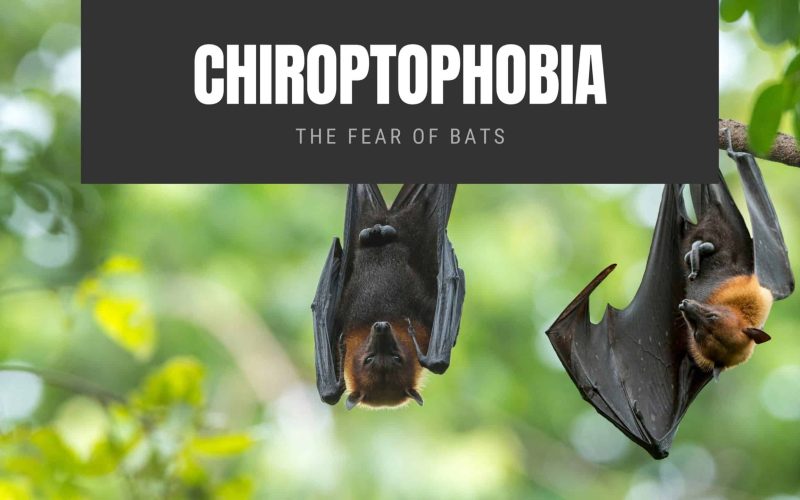Fear of bats is formerly known as Chiroptophobia. This is the extreme and irrational fear of bats. Persons with this phobia experience overwhelming stress and anxiety at the exposure or thought of bats .
Therefore, they can go at any length to avoid being triggered. This can restrict them and the way they live. This phobia is not common among people.
This could be because bats are naturally nocturnal, and people are not. Bats are active at night when most people tend to be asleep, and this phobia may seem ridiculous to the next man who is not a sufferer.
Sufferers tend to keep their fears to themselves for fear of being teased or bullied about it.
This makes it difficult for the individual to cope as the symptoms may persist. Most sufferers of Chiroptophobia acknowledge that their fear of bats is irrational and silly, yet they cannot control the anxiety they feel.
People suffering from the fear of bats need someone understanding to talk to about it. This tends to reduce the effects of the symptoms, and hopefully, the individual will recover.
That is why speaking to a therapist for professional assistance is the best approach.
Causes of Chiroptophobia
Like other phobias, the fear of bats has no cause. However, there are a handful of predisposing factors that contribute to the development of this condition, and they include:
Genetics or Heredity
Genes are traits passed down from parents to offspring. These traits help make up some physical, social, and mental characteristics. However, experts believe these fearful genes are also passed on as these traits are passed down.
Therefore, a sufferer of this condition is likely to bear children or have children who will suffer this as well.
Past Negative Experience
Generally, experts believe that previous unpleasant experiences contribute significantly to the development of phobias. For example, someone who must have sustained an injury due to contact with bats may develop this phobia.
Misconceptions of Bats
Our environment has been proven to have a substantial influence on us. Depending on the situation, this influence can be good or bad.
Living in an environment with people who sow seeds of misconception about bats in us can make us fear bats.
Many people and cultures have misconceptions about many things, people, places, and situations. Over the centuries, bats have been one of the most misunderstood creatures in the world. They are seen as ugly creatures of the night.
In ancient times, bats were considered ugly creatures with bad omens. In Europe, in the old days, a bat visiting a home signifies that someone in that family will die.
Also, the presence of bats was associated with Satan or the worship of Satan. More so, bats have been associated with vampires, darkness, and Halloween.
All this contributes to the fearful feeling of bats.
Presence of Other Phobias
The presence of phobias can cause an individual to develop this fear. For example, a person who fears vampires, darkness, Halloween, or death may also fear bats. This may be because bats are heavily associated with them.
Symptoms of Fear of Bats
Listed below are signs of fear of bats. Some of these signs can appear instantly when a sufferer sees or senses bats’ presence or when they discuss or think of bats.
The severity of these signs helps to determine the severity of this condition.
The symptoms may include:
- Panic attacks
- Hyperventilation
- Inability to Relax
- Problems Concentrating
- Being quickly tempered
- Screaming or crying
- Feelings of dizziness
- Prickly sensations like pins and Bats
- Heart palpitations
- Pains
- Feeling of danger
- Fatigue
- Dry and Sticky mouth
- Sweating Excessively
- Anxiety
- Loss of breath
- Migraines and Headaches
These symptoms cannot be controlled when the individual suffers panic attacks. However, the patient may prefer to avoid being triggered because these symptoms are very unpleasant.
Treatments
A fear of bats is not a life-threatening condition, so medical attention isn’t necessary. Many sufferers acknowledge that they may never have contact with a bat throughout their lifetime.
They would rather live and adopt coping strategies to help them cope with this fear. However, this fear can worsen and become persistent, which means persistent symptoms.
This will make the person go to any length to avoid getting triggered. This causes a great deal of limitation in a person’s life, and the individual’s social life is highly compromised. At this level, one should see a mental health worker.
A mental health worker is a trained health worker equipped with the necessary knowledge and skills to help you with the challenges in your mental health.
The knowledge and skills that these professionals possess include various techniques that can be applied to help you with your phobias. The following are the techniques:
Counseling
Counseling is a one-on-one talk with a psychotherapist. A mindful chat with a nonjudgmental person in a cool and controlled environment can be very helpful.
In the course of this discussion, your therapists will help you identify those unhealthy thinking patterns that make you fear bats and then help you correct them.
Your therapist may assure you that there is nothing to fear about bats and equip you with coping strategies to help you control or overcome your fears.
Exposure Therapy
This may be defined as the gradual exposure of a patient to his or her object of fear under professional supervision to reduce sensitivity to it. It is also known as systematic desensitization.
The therapist sets up stages of exposure, and the patient has to pass the first stage before getting to the second stage and progressively until the last stage.
In a controlled environment, your therapist may start by showing you a simple drawing of a bat. If you show less or no sensitivity to it, you progress to the next stage.
The next stage can be a picture of a bat or toy bat. Then, you may be allowed to apply some coping strategies to pass that stage successfully.
The bottom line of this technique is that the more exposed you are, the less threatened you feel about your source of fear. It teaches the patient how to regain control of self even in the face of an active bat.
Hypnotherapy
Hypnotherapy is the process of opening up the subconscious mind to reprogram and correct negative thinking and belief patterns that cause you to fear bats. This should be done strictly by a professional.
Use of Medicines
Seeing a therapist is almost enough to help you recover from this condition. But medicines are prescribed to help in suppressing anxiety and other symptoms of phobias. However, administering medicines is not a cure for phobias.
The medication may include:
- Anti-anxiety drugs: This type of drug is administered to reduce anxiety. Valium is an excellent example of anti-anxiety.
- Anti-depressant drugs: This medication is prescribed because it can lower stress. Lexapro is a typical anti-depressant.
Note: These medications are likely to have several side effects, and long-term usage can cause Substance Abuse Disorder (SAD). Therefore, these drugs should not be taken without a licensed doctor’s prescription.








